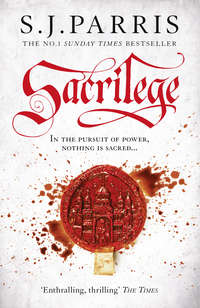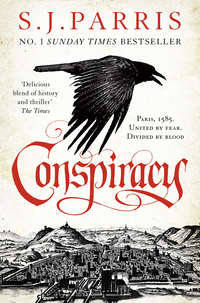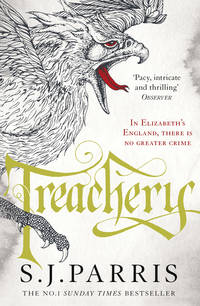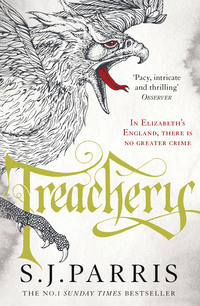
Полная версия
Heresy
‘Is this a crime?’
‘If he could have been proven to have known about or aided the secret arrival of missionary priests from France, he would have been for the scaffold. But there was no evidence against him on that count, only hearsay, and no confession could be got from him under questioning.’
‘Was he punished?’
‘His questioning was hard, but his punishment light, in the circumstances,’ said the rector, pursing his lips. ‘The earl was outraged, as you may suppose – Allen was deprived of his fellowship immediately, but the earl is merciful and he was offered safe passage to leave the country, not to return on pain of imprisonment. He went to France and took up residence at the English College in Rheims.’
‘Rheims? I have heard of it. That was founded by a William Allen, was it not?’
‘A cousin, yes. They are one of the old Catholic families. But Edmund Allen’s son Thomas, whom you had the misfortune to encounter just now, was then in his first year as an undergraduate here. He did not follow his father into exile – Thomas wished to complete his studies, but there were many in the college who felt he should be expelled simply by connection with his father’s disgrace.’
‘It would seem harsh to punish a son for his father’s beliefs. Does he share them?’
‘One never knows. All students must swear the Oath of Supremacy acknowledging Her Majesty as the head of all religious authority in the realm, but you know as well as I that a man may sign a paper with his hand and hold something different in his heart. Thomas Allen was questioned hard about his doctrines, you may be sure.’ The rector nodded significantly.
‘He was tortured?’ I said, appalled.
The rector stared at me in horror.
‘Good God, no – do you think us barbarians, Doctor Bruno? It was merely questioning – though the manner of it was not pleasant, I will admit. He was pressed on points of theology even a Doctor of Divinity would find hard to answer, and every aspect of his responses held up to scrutiny. But his father’s expulsion had been so public that the college authorities had to be seen to be utterly scrupulous with the son – we could not be accused of turning a blind eye to a known papist in our midst.’
‘He passed the test, I gather, by his continued presence here?’
‘Eventually it was decided that he could stay on, but at his own expense – his scholarship was withdrawn.’
‘Did the family have means?’
The rector shook his head.
‘Almost nothing after Edmund had paid his fines for religious disobedience. Young Thomas has done what many poor scholars in the university must do – he pays his board by acting as a servant to one of the wealthy commoners – sons of gentry and nobles who pay to study here.’ The scornful curl of his lip expressed his opinion of these commoners.
‘So one moment this Thomas is a scholarship student, the son of the sub-rector, the next he is living on crumbs, a servant to one of his friends? A hard reversal of fortunes for any man, especially one so young,’ I said, with feeling.
‘Such is the way of the world,’ the rector said pompously. ‘But it is sad, he is a bright boy and always had a cheerful disposition. He might have done well in the world. Now he is as you saw him. He writes endless petitions to Leicester to pardon his father – I find them pushed through the door of my lodgings and my private office. I have told him I’ve done all I can with regard to the earl, but he only grows more determined. It has become an obsession with him and I almost fear he may lose his wits over it. And I do pity him, Doctor Bruno – you must not think me stony-hearted. There was even a time I considered he might be a suitable match for my own daughter – his father wanted him to go into the law and his prospects seemed fair. Our families had been friends, and Thomas was certainly much taken with Sophia.’
I wondered if having a daughter of marriageable age in this cloister of young men might account for the slightly harried expression that permanently troubled the rector’s face.
‘Was your daughter interested?’
The rector’s nose wrinkled.
‘Oh, she has ever been troublesome on the question of marriage. Girls have foolish notions of love – I should not have allowed her to read poetry so freely.’
‘She is educated, then?’
He nodded absently, as if his mind were elsewhere.
‘Both my children were close in age – barely more than a year between them – and I thought it unfair that my son should have lessons and my daughter be left only to sew. Besides, young John always had trouble keeping his mind on his books, I thought it would do him good to have to compete with his sister, for she was always the sharper of the two and he hated being bested by her. In that I was correct. But now it seems I have spoiled her for marriage – she loves nothing more than to dally in the library arguing ideas back and forth with the students when she has the chance, and is much too bold with her own opinions, which is hardly seemly in a lady and no gentleman wants in a wife. So it was all for naught.’
He turned his face away then and, with a great sigh, looked out towards some point across the courtyard.
‘Why for naught? Did your son not stick to his studies?’
His face convulsed, as if with a sudden bodily pain, and with some effort he answered,
‘My poor John died some four years past, God rest him – thrown from a horse. He would have been turning twenty-one this summer, he was of an age with Thomas Allen.’
‘I am sorry for your loss.’
‘As for Sophia,’ he continued briskly, ‘she was fond of Thomas and thought of him as a friend, but now I have not thought it proper that they should associate, given the reputation of his family. His prospects are much diminished, of course.’
‘Yet another loss for the boy, hard on the heels of so many others.’
‘Yes, it is a shame,’ the rector said, without much sympathy. ‘But come, we must not stand here gossiping like goodwives – the servant will show you to your room, where I trust a good fire will be blazing for you to dry your clothes. By Jesus, that wind has grown cold, it is more like November than May. I shall look forward to seeing you at supper.’
He shook my hand and I turned to follow the servant up the dim wooden stairway to my room.
‘Doctor Bruno,’ the rector called, as I was almost out of sight. I leaned back to see his face looking anxiously up at me. ‘Please, out of charity, I ask that you do not make any mention of Thomas Allen or what I have told you of my poor John at supper – my wife and daughter find both subjects quite distressing.’
‘You must not worry on that count,’ I replied, intrigued by the idea that in a short time I would meet this boldly opinionated daughter. The prospect of an intelligent young woman’s company made the idea of supper with the rector considerably more enticing than it had seemed before.
THREE
I dressed for dinner in a clean shirt with a plain black doublet and breeches and paused for a moment to consider myself in the mottled glass that had been left resting on my mantelpiece. My hair and beard were a little too long, it was true, and the weather had left them more unruly than usual, though I had long ago decided at the Parisian court that I had neither the time nor the vanity to compete with gentlemen of fashion in matters of dress. But at thirty-five, I thought, I could still make myself presentable. My reflection looked back from large dark eyes pooled in shadow; our scuffle on the road had left a graze on my cheek, but perhaps a young woman confined in a college cloister might find that intriguing. I knew that women found enough in my appearance to please them, even though I was no prospect for a serious attachment, having neither property nor title but only a dubious kind of fame to my name; for my part, I had made the most of such opportunities as came my way in Paris, but since Morgana’s death I had met no woman with equal wit and spirit to catch my heart as well as my eye. But the rector’s daughter sounded intriguing, and I must confess that the prospect of meeting her had piqued my interest, even though I knew I could hardly afford distractions in Oxford with so much at stake and so few days.
I grinned at my reflection in the glass, ran my hands through my hair and shook my head briefly at my own foolishness, before making my way down my staircase to the archway in the east range where I had been told I would find the rector’s lodgings. As I entered its shadows, my eye was caught by a glimpse of green from the other end of the passageway, which ran the width of the building; following it to the end I emerged through an open gate of iron bars into a walled garden at the back of the college, not over-cultivated but left as an orchard, the grass grown tall and thick with wild flowers under apple trees and wooden benches set at intervals along the path that ran around by the walls. In better weather this would be a pleasant place for scholars to sit and read, I thought, though it was empty now as the rain battered at the leaves. I returned to the passageway and found the door that proclaimed the rector’s name on a plaque, straightened my clothes, and prepared myself for my first taste of Oxford hospitality.
The first thing I noticed as I waited to be admitted was that the animated conversation I could hear from behind the door was pitched slightly too loud, in the way that men in a group will compete to outdo one another if they want to impress a woman. An old servant with a pinched face opened the door and showed me straight through into a fine high room with tall arched windows in two facing walls, the rest panelled in dark wood and hung with portraits and tapestries. Immediately I understood the source of this braggadocio. At the far side of a long table set with grand sconces of candles sat a young woman of about nineteen years, dressed in a plain dove-grey gown with a straight embroidered bodice and with her long dark hair unbound. Like the rest of the guests already seated, she stopped her conversation and turned her attention to me as I approached, her eyes skimming me up and down with a mixture of curiosity and amusement. This, then, was Sophia Underhill, and I understood her father’s urgent wish to marry her off; she had a striking, feline face with keen light brown eyes and her presence in the college must have proved a sore distraction for the young men trying to bend their minds to their books. The rector rose from his chair at the head of the table with bustling importance and reached out to shake my hand.
‘Welcome, Doctor Bruno, welcome to my table. Please be seated, and I shall introduce you to some of the college’s senior Fellows, and my family.’
He gestured to the seat on his left hand, which I was pleased to note was almost opposite his daughter’s. I nodded politely to her in greeting before glancing around at the rest of the guests assembled at the table. We were ten in number, all men dressed in academic gowns, with the exception of the girl and a tired-looking woman of middle years seated at the other end of the table, opposite the rector.
‘Allow me to introduce my wife, Mistress Margaret Underhill,’ he began, gesturing towards her.
‘Piacere di conoscerla,’ I said, bowing my head. The woman smiled weakly; despite her husband’s earlier words, she did not look especially delighted at the prospect of entertaining.
‘And my daughter Sophia,’ the rector continued, unable to keep the note of pride from his voice. ‘You see that I gave her the Greek name for wisdom.’
‘Then her suitors may truly call themselves “philosophers”,’ I replied, smiling at her. ‘Lovers of Sophia.’
There was a sharp intake of breath from her mother at the end of the table and a suppressed laugh from the men present, but the girl returned my smile and blushed pleasingly before lowering her eyes. The rector forced a smile.
‘Ah, yes, I was warned that the men of your country are experts in the art of flattering ladies,’ he said tightly.
‘Especially the monks,’ grunted the elderly man seated to the right of Sophia, and the guests all laughed.
‘Former monks,’ I said emphatically, holding the girl’s gaze. This time she did not look away, and something in the frankness of her look reminded me so sharply of Morgana that I had to catch my breath, caught off-guard by the resemblance.
‘I must protest in defence of my countrymen,’ declared the dark-haired young man seated to my immediate left, who did indeed look distinctly Italian, though he spoke with no trace of an accent. ‘My father’s countrymen, I should say. I do not know how we have come by this reputation among the English as great seducers – I have certainly not inherited any such talent, alas.’ He held out his palms in a gesture of defeat and the company laughed again. I suspected the young man of false modesty in this regard – he was blessed with handsome features and obviously dressed carefully, his beard and moustache neatly trimmed. He turned to me and extended a hand. ‘John Florio, son of Michelangelo Florio of Tuscany – I am pleased to make your acquaintance, Doctor Bruno of Nola. Your reputation precedes you.’
‘Which one?’ I said, to more laughter.
‘Master Florio is a greatly respected scholar and tutor of languages, as was his father,’ said the rector, ‘and he is engaged in compiling a book of proverbs from various countries. I am sure that later he will not hesitate to regale us with some.’
‘It is, and ever was, a woman’s fashion / To love a cross, and cross a loving passion,’ Florio said obligingly.
‘He speaks the truth,’ Sophia said, with feigned dismay, and Florio beamed at her.
‘Thank you,’ said the rector, his smile growing increasingly strained. ‘I must confess, Doctor Bruno, I did not know how easily you would converse in English and I thought you might feel more at home with a fellow Italian speaker to hand.’
‘That was kind of you,’ I said. ‘I learned my English from travellers and scholars over the years, but I fear it is unpolished.’
‘My father also fled Italy in fear of the Inquisition after he converted to Reform,’ Florio said eagerly, leaning in close. ‘He came to London, ended up in Lord Burghley’s household and was later Italian tutor to Lady Jane Grey and the Princess Elizabeth.’
‘Not such a cursed exile, then,’ I said.
‘Exile is always a curse,’ the elderly man next to Sophia cut in, with surprising vehemence. ‘A cruel fate to inflict on any man, do you not agree, Roger?’ Here he leaned around to glare at the man seated on the other side of Sophia, directly opposite me, a large, broad-featured man in his late forties, with a full beard just turning to grey and a ruddy complexion, who turned away uncomfortably. ‘Particularly on one’s friends,’ the old man added. A tense silence descended over the gathering.
‘My father was indeed fortunate in his patrons,’ Florio continued hastily, attempting to cover the interruption, ‘though we were exiled again from England when I was just an infant and Bloody Mary came to the throne.’
‘God rest her soul,’ interjected the elderly man, reverently. This time the rector moved to intervene.
‘Please, Doctor Bernard.’
‘Please what, Rector?’ Doctor Bernard gestured at me, his wild white hair fanning out around his head like the crest of a bird. ‘Must I guard my words for this renegade monk? Why – will he denounce me to the Earl of Leicester?’ He turned to look at me and I understood that, though he had few teeth left and must have been at least seventy, his rheumy eyes still saw shrewdly. The hollows of his face seemed more pronounced in the flickering shadows of the candlelight; it was a face to frighten children. ‘I was appointed by Queen Mary herself, thirty years ago now, when those of the new faith were almost purged altogether from the university, and here I have remained through the storms, though my friends are all long dead or deprived of office, and I have long since renounced the old ways.’ Here he laughed, as if in self-mockery, then pointed at me, suddenly grave. ‘But I think you are of the Catholic faith, are you not, Doctor Bruno?’
‘I am an Italian,’ I replied evenly, ‘raised in the church of Rome.’
‘Well, I’m afraid you will find no one to say the Roman Mass with you here, sir. There are no Catholics left in Oxford, oh no. No man here cleaves to the old faith.’ He shook his head solemnly, but his voice was filled with bitter sarcasm. ‘Here we all sign the Declaration of Belief to save our skins, and swear our oath to the English Church as we are commanded, for we are all obedient subjects, are we not, gentlemen?’
There was an awkward murmur of assent; I saw that the rector was growing agitated.
‘William, I beg you.’
‘So we all seem. But no man in Oxford is what he seems, Doctor Bruno, keep that in mind. Not even you, I suspect.’
I looked up and met Doctor William Bernard’s eye. This spiky and gnomic old man gave the distinct and alarming impression of being able to read the secret thoughts of others, and he was nearer to the truth than I liked, so I merely inclined my head and searched for a distraction as his pale grey eyes continued to bore into me. Fortunately, one was provided by the arrival of servants bearing plates laden with the first course: boiled capons with damsons and calves’-foot jelly accompanied by a good claret.
As they bustled around the table, heaping our plates from each dish, I leaned forward with the intention of engaging Sophia Underhill in conversation, but at the same moment the bearded man opposite addressed me, and I saw Florio take the opportunity to claim the girl’s attention.
‘Roger Mercer, Doctor of Divinity and sub-rector of the college,’ the bearded man said in a rich baritone, with an accent that I believed came from the west parts of England. He extended a hand across the table. ‘We are indeed glad to make your acquaintance, Doctor Bruno, and there has been much anticipation here for your disputation with the rector tomorrow night.’
‘Now, now, Roger,’ said the rector hastily, ‘there is to be no talk of any matter touching the disputation at table. My esteemed guest and I must preserve our arguments for the debating chamber, is that not so, Doctor Bruno? We must, as they say, keep our powder dry.’
I nodded my assent. Roger Mercer held up his hand in protest.
‘Fear not, Rector – I spoke only as a prelude to telling Doctor Bruno how I have been curious to meet him since I read his book, On the Shadows of Ideas, that was published in Paris last year.’
‘Did not the sorcerer Cecco d’Ascoli, who was burned for necromancy, make mention of a book with the same title, a book of forbidden magic which he attributed to Solomon?’ Doctor Bernard leaned around Sophia once more to make this interjection, his trembling extended finger pointing almost in her face, though aimed at me. She moved her chair backwards to accommodate him, flicking her hair over one shoulder while continuing her conversation with the irrepressibly enthusiastic Florio. From the odd phrase I could catch, he appeared to be treating her to further rhyming aphorisms. Reluctantly I turned my attention back to Bernard.
‘The book Cecco mentions has never been found,’ I said, raising my voice so that the old man might hear me clearly. ‘It seemed a shame to waste a good title, so I borrowed it. But mine is a treatise on the art of memory, based on the memory systems of the Greeks – no necromancy, gentlemen.’ I laughed, perhaps too hard.
Roger Mercer eyed me thoughtfully.
‘And yet, Doctor Bruno, your memory system makes use of images that seem to correspond precisely to the talismanic figures described by Agrippa in his De Occulta Philosophia, that he claims can be invoked in the rituals of celestial magic to draw down the powers of angels and demons.’
‘But these are images that correspond to the signs of the zodiac and the mansions of the moon, familiar to many mnemonic systems,’ I said, hoping not to betray my unease. ‘They are popular because they are based on regular numerical divisions, which aids in recall, but in the end they are merely images.’
‘Nothing is merely an image to the magician,’ Bernard snapped back. ‘All are signs pointing to hidden realities, as your title implies. Especially those images derived from the ancient astrology of the Egyptians – as Agrippa well knew, for he was quoting from his master, Hermes Trismegistus, who was condemned by St Augustine for summoning demons!’
His voice rose on this last word; a cold hand gripped the base of my spine. I drew myself up to answer, but before I could speak, Sophia Underhill pulled her chair nearer to the table, looked directly at me and asked, cutting off Florio in mid-sentence,
‘Who is Hermes Trismegistus?’
The company fell silent; all eyes turned to me.
‘I have read passing reference to his name in works of philosophy,’ she continued, with an innocence I did not quite believe, ‘but I can find none of his books in our library here, and I don’t have permission to enter the university libraries.’
‘Nor should you, since you are not a scholar,’ chided her father, looking around the table as if embarrassed by her boldness. ‘I permit you to improve your mind by reading in our library as long as you keep your studies to what is fit for a lady’s understanding.’
I felt he said this for the benefit of the company; Sophia appeared about to protest, but then swallowed her words into a petulant expression. Her mother tutted again, loudly.
‘You will find no works of Hermes the Thrice-Great in Oxford now,’ Bernard said in a sonorous voice, shaking his head. ‘Before, we had them – before the great purge of the libraries in ’69. Translated out of the Greek by the Florentine Ficino a century ago, at the dying request of Cosimo de’ Medici. You know Ficino’s version, Doctor Bruno?’
‘I have read Ficino’s translation,’ I said. ‘But I have also read the original Greek manuscripts, though the collection is incomplete. The fifteenth book was lost. Do you read Greek, Doctor Bernard?’
Bernard fixed me with those bright, accusing eyes.
‘Yes, I read Greek, young man, we are not all barbarians north of the Tiber. But the missing book is a myth – it never existed,’ he added briskly. Then he went on, in a softer tone, ‘I read Ficino too, when I was young, and Agrippa. There was not such a fear of the ancient writers then. But so many books are lost to us now, carried off by the tides of reform. Centuries of learning, burned to ashes.’ He tailed off and it seemed he had travelled deep into memory.
‘Doctor Bernard,’ said the rector, a warning note in his voice again, ‘you know very well that the Royal Commission of ’69 was sent to seek out heretical books acquired in the old monastic times, lest they infect the minds of our young men with their unholy ideas – a danger we senior Fellows must guard against still. I am sure you would not wish to disagree with such a prohibition.’
Bernard gave a short, croaking laugh. ‘Books prohibited to scholars? How then should men of learning sharpen their intellect, or learn to discern between truth and heresy? And do those who proscribe not have the wit to realise that forbidden books lure men more potently than the lewdest temptress?’ Here he cast a sideways glance at Sophia. ‘Oh yes – but a forbidden book will always find its way in through the cracks and the mouseholes, do you not know that, Rector? If one only knows where to look.’ He cackled to himself as if this were a great joke, and I noticed his fellow scholars were shifting uncomfortably in their seats.
‘What happened to the books that were purged from the libraries then?’ I asked, perhaps too urgently, for my question seemed to provoke a sudden hostility from Bernard; his eyes narrowed and he pulled himself stiffly upright.
‘It was a long time ago,’ he said brusquely. ‘Burned or taken away by the authorities – who knows? I am old now, and I have forgotten those days.’
He did not quite meet my gaze and I knew he was lying; a man who spoke so passionately about books one moment would surely have remembered a public bonfire of them, even if it had occurred many years ago. But if the forbidden books were not burned, they must have passed into someone’s hands, and I wondered if the old man knew whose.







